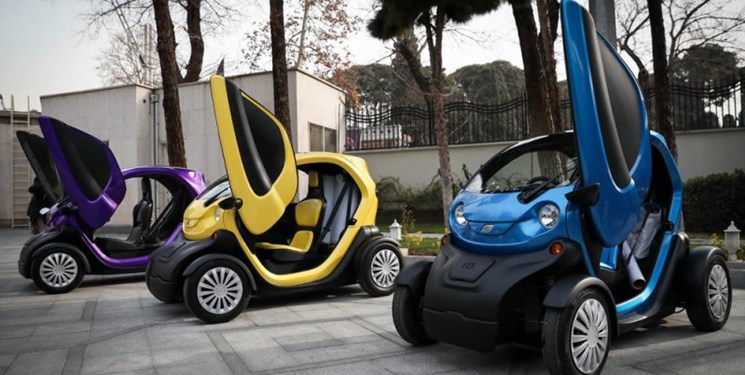
The Yuz, Iran’s domestically-manufactured electric vehicle, unveiled in November 2021.
“We must make progress to make up for this backwardness.”
The Iranian government appears to be doubling down on investment and production of lithium batteries. According to a report published by Young Journalist Club, on 8-9 July, Iran University of Science and Technology in Tehran hosted a conference to highlight local developments in the lithium battery field. Press reports suggest the conference was attended by academic and commercial representatives, but also military officers and politicians. In fact, both Iranian politicians and military personnel appear increasingly engaged in Iran’s lithium and battery industry. In March 2024, Reza Shojaei, the deputy head of the Iranian Defense Ministry’s Department of Energy Resources, claimed Iran had the technology to build electric vehicle batteries and said that the Defense Ministry would increase production by 35 percent to preclude the need to import lithium batteries. Defense officials attending the conference told Iranian journalists that they would not only commercialize electric vehicles, but also expand research laboratories and invest in lithium mining.[i]
The significance of the report is not so much a continuing emphasis on the development of electric vehicles, an item the Iranian press began reporting upon in November 2021,[ii] but rather to show the supremacy of the Ministry of Defense and Armed Forces Logistics if not the Islamic Revolutionary Guard Corps (IRGC) on the development of new and cutting-edge technology.[iii] University professors and research centers subordinate themselves to the Iranian military. This reality has ramifications as many Iranians seeking degrees in the West focus their studies on science and technology and may come under pressure if they return to Iran to work directly or indirectly for sanctioned entities.
Domestic lithium production and an indigenous lithium industry can also have a profound impact on the operational environment. If the IRGC controls its mining, it would like profit disproportionately from its sale to foreign partners such as China. Advanced military technology also increasingly integrates lithium batteries into drones and both terrestrial and submarine robots. Given Iran’s proliferation of new weaponry to its proxies, an increased battery production capability could enable the Houthis and Hezbollah to upgrade their own weaponry and capabilities in the Red Sea and Eastern Mediterranean.
Sources:
“توسعه حوزه لیتیوم نیازمند توجه و همکاریهای چندگانه”(Developing the Lithium Field Will Require Dedication),” Young Journalist Club (an official center established by the political affairs bureau of the official Islamic Republic of Iran Broadcasting to train journalists), 9 July 2024. https://www.yjc.ir/fa/amp/news/8774326
Yesterday [8 July 2024], the Iran University of Science and Technology hosted the first international conference and the second national conference on lithium batteries, representing a big step in the development of the battery industry. Shojaei Fard, Director of the Automotive Research Institute of Tehran University of Science and Technology and Secretary of the conference, highlighted the dependence of the automobile industry on the field and how initially, we were working on batteries but lithium batteries were also a new thing. “We launched the lithium battery research and innovation center, and from there the project to examine the future of lithium batteries and technology and challenges began. Despite the fact that this conference is so specialized, we had over 180 papers submitted, though we rejected a few. We also have a training workshop today that a Chinese instructor will teach, a four more workshops tomorrow. During the program, we will review top articles. We will also announce the result of a review into which is the industry-leading lithium battery… We will have four parallel meetings over two days so we can review 80 articles.”
Naderi Sharif, the chief of the Energy Resources Development Organization, stated that there are two approaches to the development of battery technology. Some favor and some oppose.
Opponents of the development of lithium battery cell technology cite reasons such as the need for heavy investment, rapid changes in cell technology and diversity in cell products. Proponents of lithium battery development also believe that lithium batteries are a strategic technology and product and that the development of the energy sector depends on this product. Cheap fossil fuel has led to the backwardness of energy supply and production and related technologies.
Naderi Sharif emphasized,”We shouldn’t just watch the world’s progress in this field, we must make progress to make up for this backwardness.”
Notes:
[i] Iran’s lithium industry has developed significantly over the past two years. In March 2023, Iranian officials announced discovery of 8.5 million tons of lithium deposits inside Iran near the Western city of Hamedan. If true, this would be the second largest lithium find after a 9.2 million ton reserve in the salt flats of Chile. Rumors also swirl in Iran that the Iranian government is both purposely allowing Lake Urmia in the West Azerbaijan province to evaporate in order to extract lithium and that it works with China to do so. The Iranian government has denied both rumors in the Persian press.
[ii] For a Persian language discussion of Iran’s domestic Yuz electric vehicle, see: “یوز در خیابانهای تهران (Yuz on the streets of Tehran)” Fars News Agency, 2 November 2021. https://www.farsnews.ir/news/14000811000836
[iii] The same pattern exists with Iran’s satellite program. For a previous discussion of the involvement of universities in Iran’s satellite program, see: Michael Rubin, “Iran: Preparing for Zafar III Satellite Launch,” OE Watch, July 2019. https://community.apan.org/wg/tradoc-g2/fmso/m/oe-watch-past-issues/284140/download
Image Information:
Image: The Yuz, Iran’s domestically-manufactured electric vehicle, unveiled in November 2021.
Source: https://media.farsnews.ir/Uploaded/Files/Images/1400/08/11/14000811000831_Test_PhotoN.jpg
Attribution: Fars News Agency
